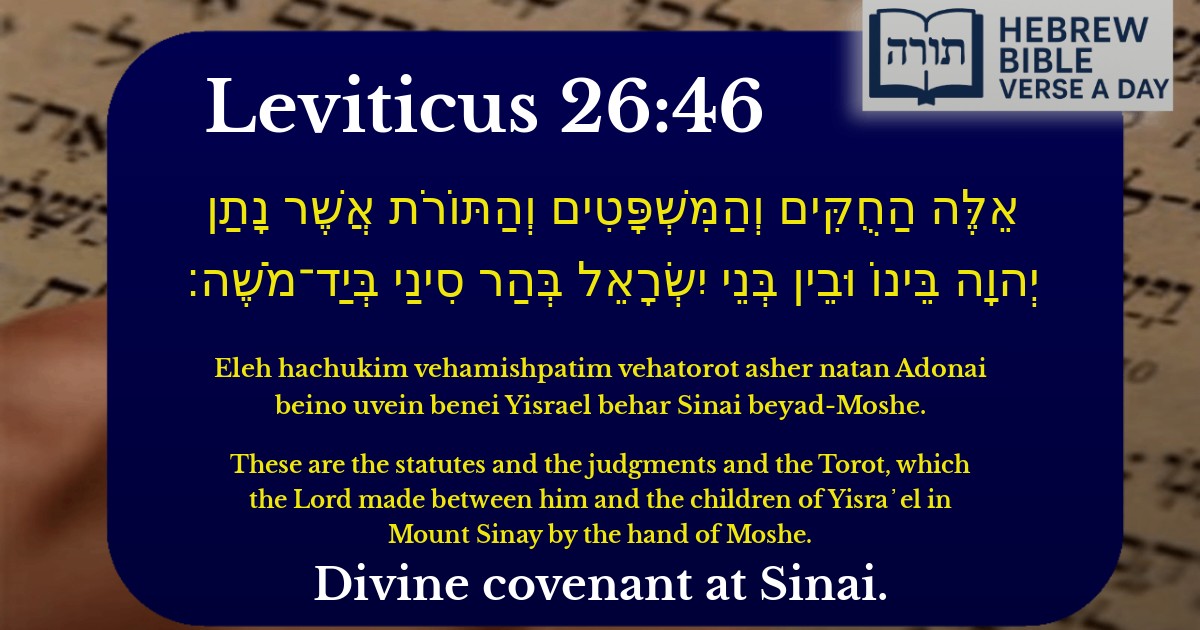Join Our Newsletter To Be Informed When New Videos Are Posted
Join the thousands of fellow Studends who rely on our videos to learn how to read the bible in Hebrew for free!
Hebrew Text
אֵלֶּה הַחֻקִּים וְהַמִּשְׁפָּטִים וְהַתּוֹרֹת אֲשֶׁר נָתַן יְהוָה בֵּינוֹ וּבֵין בְּנֵי יִשְׂרָאֵל בְּהַר סִינַי בְּיַד־מֹשֶׁה׃
English Translation
These are the statutes and the judgments and the Torot, which the Lord made between him and the children of Yisra᾽el in Mount Sinay by the hand of Moshe.
Transliteration
Eleh hachukim vehamishpatim vehatorot asher natan Adonai beino uvein benei Yisrael behar Sinai beyad-Moshe.
Hebrew Leining Text
אֵ֠לֶּה הַֽחֻקִּ֣ים וְהַמִּשְׁפָּטִים֮ וְהַתּוֹרֹת֒ אֲשֶׁר֙ נָתַ֣ן יְהֹוָ֔ה בֵּינ֕וֹ וּבֵ֖ין בְּנֵ֣י יִשְׂרָאֵ֑ל בְּהַ֥ר סִינַ֖י בְּיַד־מֹשֶֽׁה׃ <span class="mam-spi-pe">{פ}</span><br>
אֵ֠לֶּה הַֽחֻקִּ֣ים וְהַמִּשְׁפָּטִים֮ וְהַתּוֹרֹת֒ אֲשֶׁר֙ נָתַ֣ן יְהֹוָ֔ה בֵּינ֕וֹ וּבֵ֖ין בְּנֵ֣י יִשְׂרָאֵ֑ל בְּהַ֥ר סִינַ֖י בְּיַד־מֹשֶֽׁה׃ {פ}
🎵 Listen to leining
Parasha Commentary
📚 Talmud Citations
This verse is quoted in the Talmud.
📖 Megillah 19b
The verse is referenced in a discussion about the divine origin of the Torah and the role of Moses in transmitting it.
📖 Sanhedrin 56a
Cited in the context of the Noahide laws and the broader framework of divine commandments given to Israel.


Understanding the Three Categories of Law
The verse mentions three types of commandments: חֻקִּים (chukim), מִשְׁפָּטִים (mishpatim), and תּוֹרֹת (torot). Rashi (Vayikra 26:46) explains that these terms refer to different aspects of Torah law:
The Divine Source of Torah
The phrase "אֲשֶׁר נָתַן ה' בֵּינוֹ וּבֵין בְּנֵי יִשְׂרָאֵל" ("which the Lord made between Him and the children of Israel") emphasizes the covenantal nature of Torah. The Sifra (Behar, perek 8) teaches that this establishes the Torah as an eternal bond between Hashem and Klal Yisrael, not subject to alteration or abrogation.
The Role of Moshe Rabbeinu
The verse concludes by stating that the Torah was given "בְּיַד־מֹשֶׁה" ("by the hand of Moshe"). The Rambam (Hilchos Yesodei HaTorah 9:1) derives from this that Moshe was the sole authentic transmitter of Torah from Hashem to Bnei Yisrael, establishing the principle of Torah MiSinai (Torah from Sinai) as the foundation of Jewish belief.
The Singular Event at Har Sinai
The mention of "בְּהַר סִינַי" ("at Mount Sinai") serves as a reminder that the entire Torah – written and oral – was given at Sinai, as the Talmud (Berachos 5a) states: "Even what a seasoned student will one day teach before his teacher was already told to Moshe at Sinai." This underscores the divine origin and unchanging nature of Torah law.